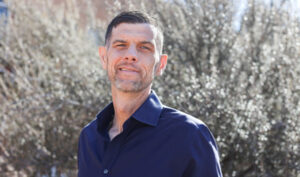When it comes to helping students find the right classes for their career goals or being placed into classes that fit their skill level, Community College of Aurora’s Testing Coordinator Michael Coyne is a major factor in helping placement.

When it comes to helping students find the right classes for their career goals or being placed into classes that fit their skill level, Community College of Aurora’s Testing Coordinator Michael Coyne is a major factor in helping placement.
After spending years coordinating testing and educational efforts for the U.S. military in the Middle East and Europe, Coyne says he’s happy to be in Aurora helping students navigate through higher education.
“We take results from self-assessments and other tests and process them. This allows us to place students in their proper course for their area of focus,” Coyne said. “I’m also constantly looking for new ways to enhance the testing center experience for prospective students.”
Coyne said his career in higher education has been an unusual one but very rewarding. It started shortly after September 11, 2001 when he took a contract job working for the U.S. Army in Kosovo. As a civilian, he worked supporting the military’s education programs. Afterward, he completed his undergraduate degree from Old Dominion University and later his master’s degree from the University of Oklahoma.
In 2004, Coyne took a contract job with the military again, this time in Uzbekistan. While there, Coyne supported the Armed Forces with their educational training, promotion, and their language initiatives. At the time, Coyne said he experienced multiple seizures, attributing them to his epilepsy. He would later learn that he was exposed to toxins like cyanide, arsenic, multiple forms of uranium and a variety of other toxins.
Advancing his career as a testing center administrator in higher education, Coyne eventually took a contract for the military in Kandahar, Afghanistan and Al-Taj, Iraq, where he said the atmosphere was much more serious.
“Working in Kandahar was more intense, oftentimes we would find ourselves under siege” he said. ”
The effects of the exposure to jet fuel and toxins became apparent around 2017, when Coyne said his sister called him crying one day.
“I asked her what was going on and she said I looked like I was dying,” Coyne said, recalling her reaction to one of his social media pictures at the time. After examining the picture, Coyne decided to have his health reviewed by a doctor.
“I had a tumor the size of a small grapefruit in my colon,” Coyne said. “They started aggressive radiation. After two rounds of chemotherapy, they were able to remove the tumor.”
It eluded Coyne at first as to how he could have cancer near the age of 40. Through research and contact with former colleagues, Coyne was able to put together that he was exposed to toxins and jet fuel during his time in Uzbekistan and Kuwait.
Even after getting the cancerous tumor removed, Coyne continued to experience health difficulties. During brain surgery in 2020, he had a stroke during the procedure. Coyne had to relearn how to read and write, taking speech and physical therapy daily. Through resilience and will power, Coyne was able to regain his communication skills.
After experiencing so much, Coyne said he wanted to find a position that felt natural.
“I need to be somewhere where I feel like I belong, and that’s how I ended up at CCA,” Coyne said. “It’s not just the kindness, it’s the genuineness and the empathy too. When I’m working here, I‘m able to pass some of it on. CCA is not just about tests and showing up on time, the institution values goals that are important to the community like economic mobility. These things that are really paramount to this organization are what brought me here and will keep me here.”
